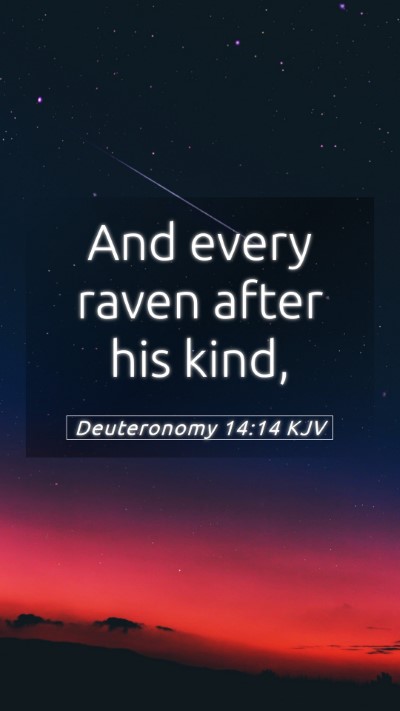Understanding Deuteronomy 14:14
Deuteronomy 14:14 states, "And every beast that hath two claws, and is not clovenfooted, shall be unclean unto you: for it is unclean unto you." This verse, within the context of dietary laws given to the Israelites, emphasizes the importance of ceremonial cleanliness and obedience to God’s commandments. To fully grasp the meaning of this Bible verse, let us delve into various interpretations provided by well-known public domain commentaries such as those by Matthew Henry, Albert Barnes, and Adam Clarke.
Commentary Insights
Matthew Henry's Commentary
Matthew Henry elucidates that this verse is part of a broader context where God outlines the distinctions between clean and unclean animals. He emphasizes the significance of these dietary laws, indicating that they not only served a physical purpose but also a spiritual one, teaching the Israelites about holiness and separation from sin. These distinctions reminded them that they were a chosen people, called to live differently.
Albert Barnes' Notes on the Bible
Albert Barnes provides a detailed explanation of the terms "cloven-footed" and "two claws." He highlights that these characteristics were significant in identifying which animals were permissible to eat. Barnes asserts that the dietary regulations were not merely arbitrary but served to illustrate deeper spiritual truths, including the idea of being set apart for God.
Adam Clarke's Commentary
Adam Clarke emphasizes the symbolic nature of these laws, suggesting that they were designed to help the Israelites understand their relationship with God. Clarke notes that the concept of cleanliness extended beyond physical statutes, symbolizing a spiritual state that was desired in their worship and daily lives.
Spiritual and Practical Applications
The understanding of Deuteronomy 14:14 goes beyond mere dietary restrictions. It calls for believers to reflect upon their own lives and the choices they make in light of God's commandments. It serves as a reminder to live in accordance with God's word and to maintain spiritual integrity in their lifestyle choices.
Relevance for Today's Believer
For those engaged in Bible study or participating in Bible study groups, this passage provides a framework for understanding how Old Testament laws can illuminate our current practices and beliefs. It invites believers to consider how these ancient teachings on cleanliness and dietary laws might inform their understanding of holiness and obedience to God today.
Bible Verse Cross References
- Leviticus 11:4 - Provides additional dietary laws.
- Isaiah 66:17 - Discusses the consequences of eating unclean animals.
- 1 Peter 1:16 - Highlights the call to be holy as God is holy.
Conclusion
In conclusion, Deuteronomy 14:14 offers a rich tapestry of meaning when we consider the comments of various biblical scholars. By engaging in Bible verse interpretations and Scripture analysis, readers can extract profound insights and apply these teachings to enrich their understanding of God’s expectations and their walking in His ways. This verse serves as a guide for both historical context and contemporary application, reiterating the significance of living a life committed to the principles laid out in Scripture.


